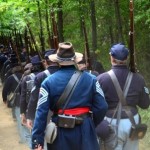Family history researchers and reporters ask: Who? When? Where? What? How?
If not, these are the five questions a family history researcher should be asking when doing genealogical research.
These questions help place people in your ancestor search in a time and in a particular place. These inquiries make a big difference in verifying whether a family story is true, or not. This RecordClick genealogist has been making those inquiries for more years than I can remember.
I’m borrowing George Clooney’s family again – this time his Great-Great-Grandfather Joseph H. Koch.
Born in Germany in 1825, Joseph H. Koch came to the United States at a young age and settled in Clermont County, Ohio on the north side of the Ohio River. As this family history researcher was looking for information, a notation on FindAGrave mentioned that he was an eyewitness to the assassination of President Abraham Lincoln. That tidbit of information will catch the attention of a genealogical researcher in a hurry. How could this Joseph have witnessed that pivotal historical event? Was he present at Ford’s Theater in Washington, D.C. that tragic evening?
According to U.S. Census records, Joseph Koch (pronounced Cook), spent most of his life in Clermont County, Ohio working as a cooper (a maker of barrels) with the exception of about five years when he and his first wife, Christine, lived in Kentucky. In 1860, the family resided in Louisville with the three youngest children, Sophia, William and Francis, born in Kentucky. By the time the next child, a son John, was born, the Kochs had moved back to Ohio. Considering the hostilities that were developing, it may have been a sensible move.
A family history researcher will find that a huge amount of information has been compiled and is available about the Civil War and the soldiers who fought for both the north and the south. The first step in the genealogical search is to find out what unit the soldier was with. The National Park Service has an online database – Soldiers and Sailors Data Base – listing over six million individuals who served, the state they were from, and their unit. Once the family history researcher is on the site, to get to the data base, type in “Soldiers and Sailors” by the magnifying glass in the upper right hand corner of the page. Joseph H. Koch is one of two Joseph Kochs to serve in the Union Army from Ohio.
Next, if the individual is still alive, a family history researcher can look in the 1890 Veteran’s Schedule of the U.S. Census. While most of the 1890 U.S. Census was destroyed by a fire, the Veteran’s Schedule, however, was not. The family history researcher may find it on the FamilySearch web site. Joseph Koch, living in Clermont County, Ohio, had been a sergeant in “G” Company of the 50th Ohio Infantry. He enlisted on 13 August 1862 and was discharged on 4 March 1865. His military records are available to the family history researcher for a fee online from the National Archives. Some documents may be online at Fold3.
While these sources provide information to the family history researcher on the who, what and when of your ancestor search, the where is still missing.
Could Joseph Koch have been in Washington, D.C. on 15 April 1865?
Available to the family history researcher is a complete record of the Civil War, A Compendium of the War of the Rebellion, written by Frederick Henry Dyer over a 40 year period. Published in 1908, the three volume work listing every unit and its activities in the Civil War can be found on Google Books. A nice synopsis of the Ohio 50th compiled by Larry Stevens is online on the Ohio Civil War web site. The Ohio 50th was involved with the Campaign of the Carolinas from March 1 – April 26, 1865 with an advance on Goldsboro, North Carolina beginning on March 6. After being discharged on March 4, Joseph probably wanted very much to go home. Times and transportation being what they were, he very well could have been in Washington, D.C. when Abraham Lincoln was assassinated.
Researching the history of a family can get complicated and confusing for everyone including the family history researcher. The ancestor search is more than just believing the story that has come down through several generations. The real genealogical research is finding the facts that prove or disprove the lore.
Sometimes… sometimes… there is truth in the lore. But, it may not be quite what we think it is.
If you have a story that needs fact checking, have come up against a wall or have a family code that is tough to crack, talk to a family history researcher at RecordClick. We have the knowledge and resources that make your genealogical history accurate and interesting.








